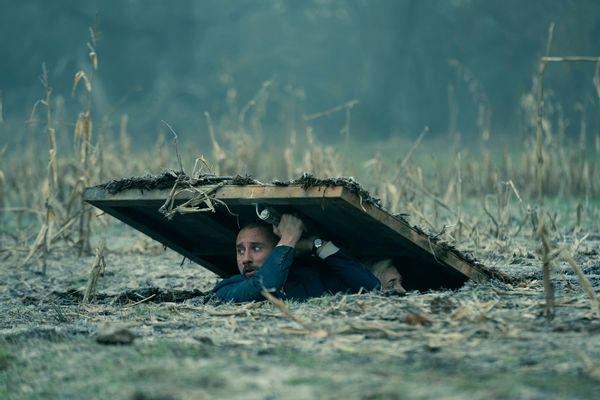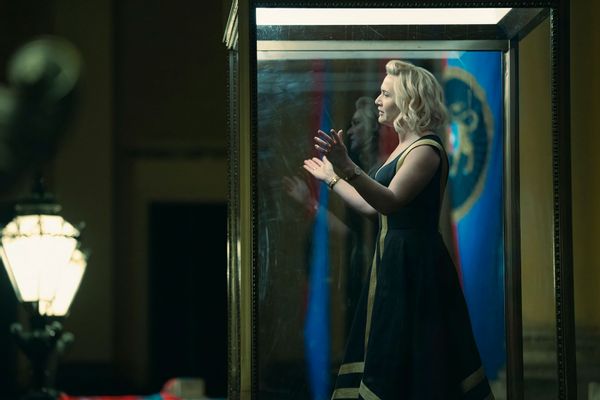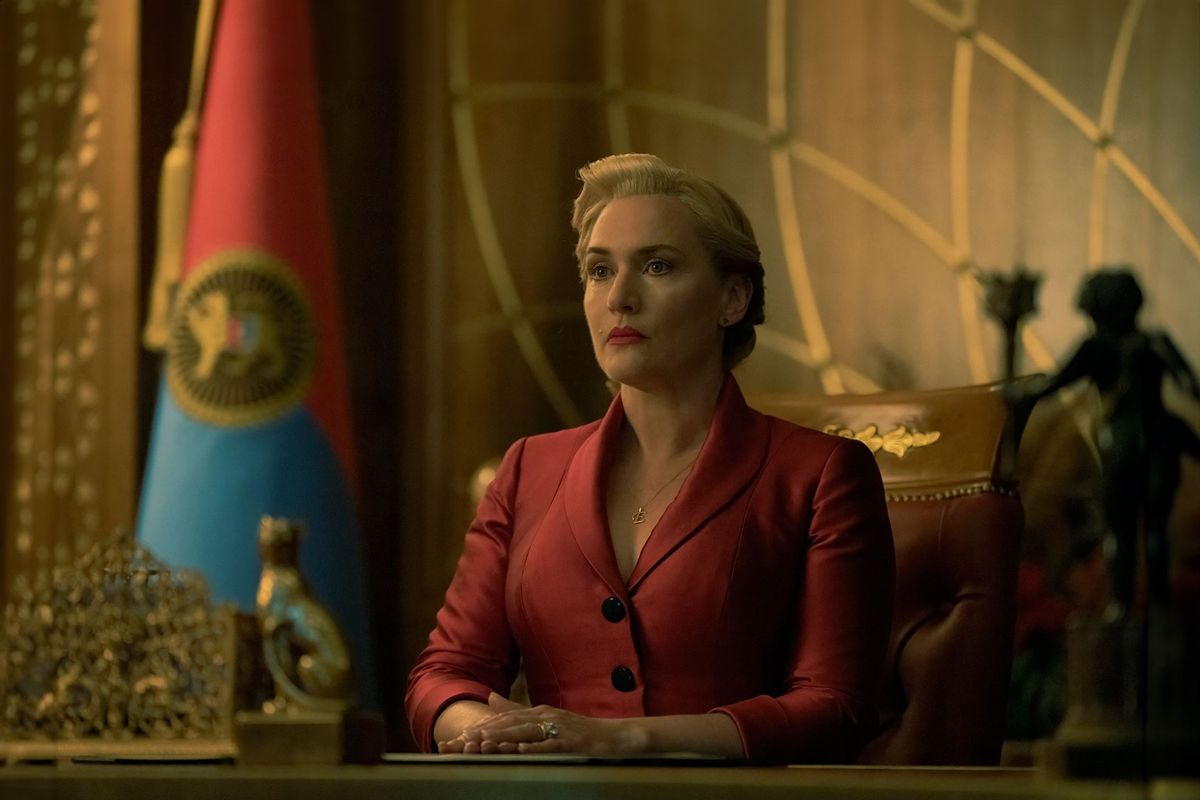For a brief window of time — no more than a crack — it looked as if Elena Vernham (Kate Winslet) might get what was coming to her. The finale of "The Regime'" finale opened with the middle-European dictator and her psychotic ex-military lover Herbert Zubak (Matthias Schoenaerts) on the run through barren fields, trying to hide in the bombed-out ruins of her cuckolded husband's poetry center — Elena still in her red silky holiday gown, Herbert with a sad service pistol. Eventually they squeezed into a hovel before being discovered by a turncoat cabinet member.
Will Tracy, the series' creator, is amply aware that this is how things usually end for autocrats and strongmen. Elena, however, demanded a separate denouement — one where she lived on as a puppet leader boxed in by Western interests who prop up her rule and pull the strings.
Twenty years worth of reading about dictators for pleasure, along with knowing how the world works and writing for shows like "Succession," told Tracy that was the right ending for this limited series, he says. While much of the final hour is inspired by the 1989 flight and capture of Romanian dictator Nicolae Ceaușescu and his wife Elena (coincidence, I'm sure?), Tracy believes he had good reasons for sparing Winslet's charismatic leader from the same fate. For one, powerful people with billionaire pals tend to evade consequences.
Tracy says he sees Elena as the kind of authoritarian who might well be successful if she rose to power.
"She's so aware of the optics of 'strong woman leader,' Tracy told Salon in a Zoom interview, "that I think someone like that could come along, who's actually quite repressive, and have quite a bit of success in winning the general political approbation of America and the West, much as Ceausescu tried to do.
"She'd be seen as, ‘Oh, she may be somewhat of an authoritarian but she's one of the good authoritarians.' Someone who could do all the same terrible, repressive things, but put in that perfect glass box with the perfect hair and the perfect dress and [could] say all the right things at the right junctures to evade any sort of reprisals from the international community — I feel like that could happen."
That time may not be far away. Tracy mentioned Italian Prime Minister Giorgia Meloni (who isn't a fascist, she swears!) and leading French presidential contender Marine Le Pen as examples of what such a figure might look like. rather than pointing closer to home.
Tracy doesn't pretend there aren't parallels to be found between his fake nation's politics and ours, which we discussed — along with the show's uncategorizable tone and the surprising genre that inspired Elena's character arc — in this pre-finale conversation.
This transcript has been lightly edited for length and clarity.
When we picture the ways autocracies end and, more specifically, how dictators end, the greatest hits to mind. You know, your Saddam Husseins, your Muammar Gaddafis — and Hitler, of course — strongmen who lived large and died in bunkers or spider holes or in some other ignominious way that comforts us into thinking justice was served. None of that happens to Elena. Was that ending always your plan? Do think she's received her just deserts?
When I was originally conceiving what the ending would be — especially because the last episode, in many ways, fairly closely tracks the end of the Ceaușescu regime in Romania, I had imagined it would end like it did for him, where, you know, the rebels bring him into some sort of hastily convened tribunal, and he’s shot or hung in the town square.
But a certain point – well, two things. The long life of many of these regimes is one of their notable features, because they know what waits on the other end. It's either the Hague or you’re hung in the town square. And so it becomes all about survival.
Once I had landed on the idea of survival being really her only animating impulse, then I just tried to remind myself that she's useful. She actually begins the series as a useful state agent of the U.S. It felt too easy or expected or, in some ways, also too just, in a way that didn't feel like the real world, for her to get her just deserts. She would still be of use to the U.S. in whatever this new Cold War is with China, because of her position in the region and because of her resources and what she can offer in that conflict.
She would go for that immediately if it was offered to her. Unfortunately, all of what I just said comes at the expense of the relationship at the heart of the show – the love story, if you will, if you want to call it that.
 The Regime (HBO)
The Regime (HBO)
You also have the symmetry of her in the glass box, speaking to her people, and then him in a glass box, shall we say, elsewhere.
Even though she's kind of made it out, she is in some ways in that box, right? She's a prisoner of this kind of geopolitical deal that she's accepted. By the end, she's been reduced to a very small box, as powerful as she is. It's a very small box.
You’ve talked about the fact that Elena is an amalgamation of different dictators. But given everything that's going on right now, with the presidential election, did you kind of step back and say, "I wonder what kinds of similarities people are going to see.” Did that ever cross your mind?
No. It’s a very reasonable question, and there could have been interesting opportunities, had I allowed my mind to go there. I tried not to go there because I'm always a little afraid of feeling like it's going to mirror anything that is happening. I tried to shut out as much of that real-world anxiety about the election here as possible. Hopefully, you know, if people find that parallel, they can find it. But you become a hostage to the news cycle if you're thinking about that while writing it. Because you can get in real trouble trying to predict what's going to happen in a year's time and being very wrong and looking very silly.
Hopefully, it lands in a place where it might not have as many resonances now as it does in a few years. That's what you hope for, at least.
We need your help to stay independent
Between what you wrote for “The Regime,” and your studies to prep for the show and create this character, do you see any similarities to the current political climate?
Yeah. I mean, I've said this a few times, but one parallel that I see amongst a lot of kind of autocratic or authoritarian-leaning figures is that when they first arrive on the scene, there's something off about them. They look funny or they sound funny or they're not plausible, in some way, as a head of state. I think we can think of someone that might remind us of.
What happens, though, is they use that sort of implausibility, the fact that they’re so odd or off or different, and they weaponize it and that becomes their superpower. Right?
They’re the "outsider."
Exactly. They use that to catapult themselves, or they have some sort of strange, uncanny charisma that is so unlike what we think of as the charisma of a politician. They use that to become more and more powerful, but they never forget that they used to laugh at me, right? That becomes the animating thing that drives them, even when they've reached the heights of power. It's somehow not enough. They need more power and the people who tried to keep them from power need to be punished even more harshly.
Of course, the more powerful you become, the more out of touch you become. Also the more laughable you become and the more ridiculous you become, so the problem just compounds itself. I don't need to put too fine a point on the parallel, but I think it's there if you want it.
Understood. I also wanted to ask about the specific choice of having Elena address her constituents as “my loves” and rhapsodize about “our love.”
It comes up quite a bit. I think there are versions of real love in the show, and then there's also that kind of on-camera love, that kind of fakey “my loves” sort of address. And then there's also wishing it to be true fairytale love.
"It's very studied, how she uses whatever her idea of femininity is. Sometimes it's strangely sexual, sometimes strangely maternal, depending on who she's talking to and what kind of message she's trying to get across."
Part of it probably comes back to my choice to make the character a woman. It's rare, maybe, to have that type of authoritarian woman leader in modern times, and I think she's the one who weaponizes that. It's very studied, how she uses whatever her idea of femininity is. Sometimes it's strangely sexual, sometimes sort of strangely maternal, depending on who she's talking to and what kind of message she's trying to get across.
Sometimes, it's sort of the weird maternal, infantile and sexual all combined all at once, like when she's singing “Santa Baby.” It's all a little bit confused, but it's all serving something, it's of a purpose. She's trying to convey a sense of warmth and connection that's maybe different from what you would get from your typical strongman, even though she ended up being just as repressive and strong, in that sense, as any male authoritarian would.
 The Regime (HBO)
The Regime (HBO)
I also come back to that image of her in the glass box. It reminded me of the pope —
Yes. That’s right. And it’s also a little bit like a doll still in its packaging.
That’s exactly what I was going to say. She looks like the very special collectible doll that someone would get for Christmas.
I think that some part of her thinks of herself like that and uses that while, at the same time, that is her insecurity, deep down, hardwired from childhood: “You are just a doll in a box and you're not really a serious figure.” That is, I think, her great insecurity, which is also her weapon.
Want a daily wrap-up of all the news and commentary Salon has to offer? Subscribe to our morning newsletter, Crash Course.
Now that “The Regime” has come to an end, I’m looking at it as part of a through-line: You wrote for “Succession,” and you co-wrote “The Menu.” These, along with “The Regime,” address people in power and our relationship with them. We see average characters being in relationships with these figures of massive power, but there’s also how the audience reacts to them.
People love the Roys, even though they are terrible. The same is true of Elena and “The Menu," where the person who's not meant to be there is the only person to get away. You almost want to cheer at the end when everybody gets whatever justice the chef believes is due to them. What do you see people reacting most here — and what draws you to these stories about power differentials?
In terms of the first question, I try not to look at too much of what anyone is saying. But what I looked at the most and what everyone who worked on the show was focused on was that central relationship, which both follows the contours of — not romantic comedy necessarily, but kind of a romance movie, or even a real-life romance: The way they meet, the sort of intensity of those early episodes, where you kind of get ahead of yourself emotionally, and it means everything. Suddenly, you've convinced yourself, “Oh, maybe I'm a completely different person.”
And then at some point, the person who you're with sees the real person, who you really are, and you see who that person really is, and it becomes quite real. There's sort of a fracture, and then we basically have them break up. Then, during the breakup, he finds a rebound, if you will, and the rebound tells him everything that his former partner did to hurt him.
Everything is true, that this rebound person is saying. And yet they just don't have that thing that the old person has, right? And so they kind of get back together, and they convince themselves it's going be different: "Now we're going to be self-actualized adults.”
"The long life of many of these regimes is one of their notable features, because they know what waits on the other end. It's either the Hague or you’re hung in the town square."
I think the reason why it doesn't work, and this is getting to your second question is that they're starting from a point — his pain and his trauma is not only different from her pain and her trauma, but they are at direct odds with each other, because his pain is that he's a product of the system in some ways, and the system was created by her. Her pain is the insecurity hardwired by her father that we spoke of earlier, but also the fact that her brain has been warped by the unchecked adulation of millions of people like him.
They're never going to get to a point where they can be at an equitable level in their romance. And so it becomes unsustainable.
I liked telling that story as a larger kind of political allegory, because while their love story is going through its ups and downs, there's the parallel story of what's happening with her and her own people. I guess anything I wanted to say about how power works was being communicated by the contours of that love story.
When people think about rom-coms, this is not the kind of story that comes to mind. But that brings up another point: I think when people were watching this, it was initially digested as a comedy, but there's something very uncomfortable about it. Did you envision a genre label for this?
No. I have a long comedy background, so when I wrote it I thought, somewhat naively, “Oh, this will be a nice change of pace. Finally, I've written something that’s not a comedy!” I mean, I'm not an idiot. I realize the bits that I wrote that are meant to be funny.
But all these little bits are lightly adapted from the real-world lives and the real-world palaces of these leaders. A lot of that stuff is just straight from the research. It wasn't me trying to put in a big funny joke. I think what that shows is that there's something inherently absurd about a world where someone has that kind of unchecked power, and everyone around them has to pretend that their version of reality is reality. I would find it very hard to write that without it being, in some way, darkly funny. The self-serious version of that would feel totally wrong to me.
All episodes of "The Regime" are streaming on Max.



Shares